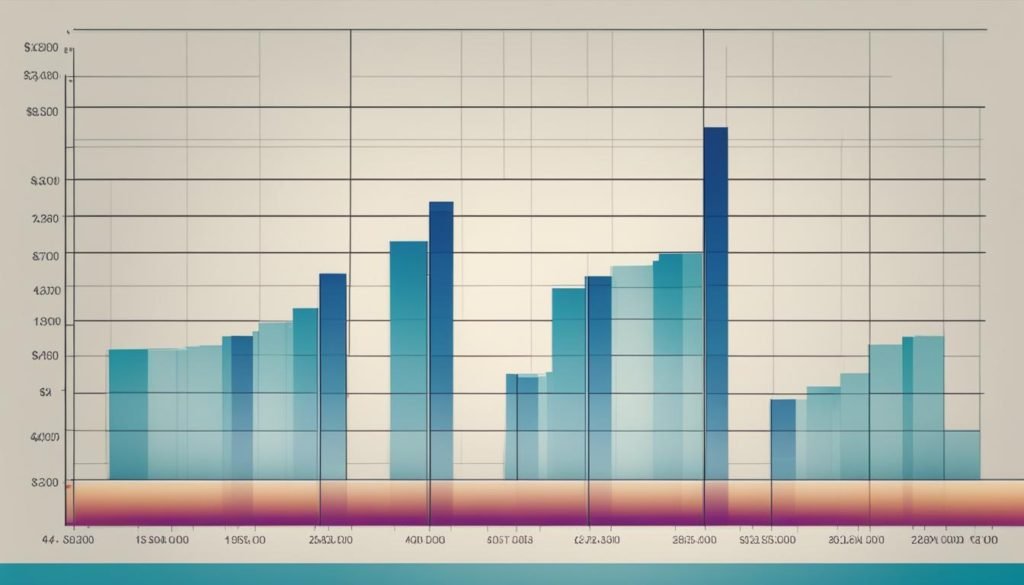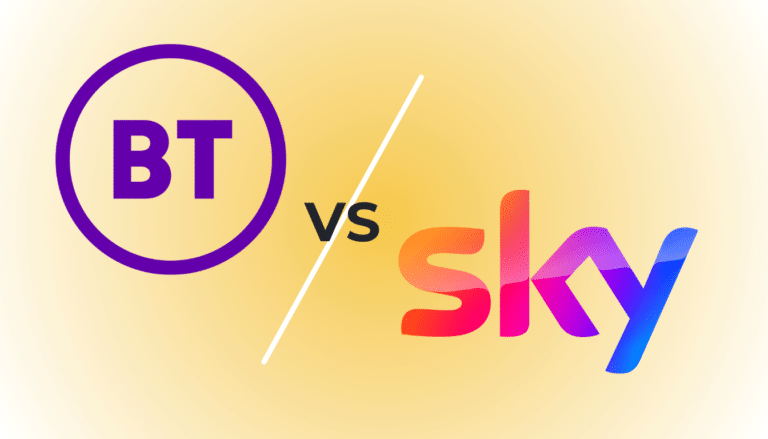Welcome to our in-depth exploration of the future of broadband in the UK. As technology continues to evolve, so does our need for fast and reliable internet connectivity. In this article, we will delve into the latest trends, predictions, and developments in UK broadband technology. From the roll-out of 5G broadband to the national broadband plan and investments in digital infrastructure, there are many exciting changes on the horizon for high-speed internet in the UK.
As consumers, it’s important to stay informed about the future of broadband and what it means for us. From potential changes in pricing to the growth of full-fibre broadband, understanding these developments can help us make the best choices for our internet connectivity needs. So, let’s dive in and explore what lies ahead for broadband in the UK.
Key Takeaways:
- The future of broadband in the UK is evolving rapidly with advancements like 5G technology and full-fibre broadband.
- The national broadband plan and investments in digital infrastructure are driving growth and innovation in the industry.
- Price changes and mid-contract price rises are important considerations for consumers, and being aware of cancellation policies and options for switching providers is crucial.
- Ofcom plays a vital role in ensuring fair competition and consumer protection in the broadband market.
- Access to affordable and reliable broadband services is essential for staying connected and maximizing opportunities in today’s digital world.
Understanding Mid-Contract Price Rises
Mid-contract price rises are an unfortunate reality for many broadband customers in the UK. These price increases occur when providers choose to raise the cost of monthly bills during the contract term. The reasoning behind these increases is often tied to factors such as the inflation rate and rising business costs. It’s essential for consumers to understand the mechanics of mid-contract price rises so that they can make informed decisions about their broadband contracts.
Typically, price rises occur once per year and are linked to the Consumer Price Index (CPI) inflation rate. Providers usually add an additional percentage to the CPI rate to account for their own rising business costs. For example, in 2023, the CPI rate was 10.5%, contributing to larger price increases for broadband contracts. These price rises can have a significant impact on customers’ monthly budgets and overall affordability.
Customers should be aware of when these price rises occur, as they often happen around April. This knowledge can empower them to explore their options and potentially find a better, more affordable broadband deal. By staying informed and proactive, customers can navigate the landscape of mid-contract price rises and ensure they are getting the best value for their money.
To summarize, mid-contract price rises are a common occurrence in the UK broadband market. These increases are tied to factors such as the inflation rate and rising business costs. Customers should stay informed about when these price rises occur and consider their options for finding a more affordable deal. Being proactive can help customers navigate the impact of mid-contract price rises on their monthly budgets and overall affordability.

Inflation Rate and Consumer Price Index (CPI)
The inflation rate and Consumer Price Index (CPI) play a significant role in mid-contract price rises. The inflation rate measures the general increase in prices for goods and services over time, while the CPI specifically tracks the cost of a basket of goods and services commonly purchased by consumers. Providers use the CPI as a benchmark to determine the percentage increase for their mid-contract price rises. The balance between rising costs and the impact on consumers’ budgets is a delicate one that providers must navigate.
| Year | Inflation Rate | CPI |
|---|---|---|
| 2020 | 1.2% | 105.3 |
| 2021 | 2.0% | 107.0 |
| 2022 | 3.8% | 111.0 |
| 2023 | 10.5% | 122.8 |
Table: Inflation Rate and Consumer Price Index (CPI) in recent years.
Broadband Providers and Mid-Contract Price Increases
When it comes to broadband contracts, one important aspect that consumers should be aware of is the potential for mid-contract price increases. These price rises, which typically happen once a year, can impact the affordability of broadband services and catch customers by surprise. Understanding which providers have a history of increasing prices mid-contract is crucial for making informed decisions and managing costs.
In 2023, several major broadband providers in the UK, including BT, Plusnet, EE, Vodafone, and TalkTalk, raised their prices by CPI rate + 3.9% (14.4%). While these increases are often included in the contract terms and conditions, making it difficult for customers to cancel without penalty, other providers have more flexible policies. Virgin Media, Sky, NOW Broadband, and KCOM, for example, do not have set annual price rises and allow customers to cancel or switch within 30 days if prices increase mid-contract.
It’s important for consumers to carefully review the contract terms and conditions before signing up with a broadband provider. Understanding the cancellation policies and any potential price increase clauses can help customers make informed choices. By choosing a provider with more flexible terms or exploring alternative options, consumers can better protect themselves from unexpected price hikes and ensure they have the most affordable and suitable broadband service for their needs.
Here is a table summarizing the mid-contract price increase policies of major UK broadband providers:
| Provider | Mid-Contract Price Increase Policy |
|---|---|
| BT | Increases prices by CPI rate + 3.9% (14.4%) |
| Plusnet | Increases prices by CPI rate + 3.9% (14.4%) |
| EE | Increases prices by CPI rate + 3.9% (14.4%) |
| Vodafone | Increases prices by CPI rate + 3.9% (14.4%) |
| TalkTalk | Increases prices by CPI rate + 3.9% (14.4%) |
| Virgin Media | No set annual price rises; allows cancellation/switching within 30 days if prices increase mid-contract |
| Sky | No set annual price rises; allows cancellation/switching within 30 days if prices increase mid-contract |
| NOW Broadband | No set annual price rises; allows cancellation/switching within 30 days if prices increase mid-contract |
| KCOM | No set annual price rises; allows cancellation/switching within 30 days if prices increase mid-contract |
By being aware of which providers are more likely to increase prices mid-contract and understanding the cancellation policies, consumers can make informed decisions that align with their budget and needs. It’s always recommended to compare different providers and consider their respective price increase policies before committing to a broadband contract.
The Growth of Full-Fibre Broadband in the UK
The UK is experiencing a significant expansion in full-fibre broadband coverage, with a focus on improving internet connectivity and enhancing digital infrastructure. As of September 2022, full-fibre broadband reached 42% of homes in the country, and this figure is expected to grow even further. According to Ofcom, the regulatory authority, full-fibre internet is predicted to be available in 50% of UK homes by March 2023 and over 80% in the next two years. This accelerated growth is driven by competition and increased investment from network builders.
Alternative network providers are playing a crucial role in expanding full-fibre broadband access. These providers are investing heavily in building new networks, with an estimated investment of £17 billion by 2025. The competition among network builders is fostering innovation and bringing enhanced internet connectivity to more areas across the UK. This healthy competition and investment are crucial in ensuring that consumers have access to fast and reliable broadband services.
| Key Players in Full-Fibre Broadband Expansion | Investment | Expected Coverage by 2025 |
|---|---|---|
| Openreach | £12 billion | 20 million premises |
| Virgin Media | £10 billion | 16 million premises |
| Hyperoptic | £1 billion | 2 million premises |
The growth of full-fibre broadband in the UK is not only beneficial for consumers but also for the overall economy. High-speed internet connectivity is essential for businesses, remote working, education, and innovation. With full-fibre networks becoming more widespread, the UK can foster digital transformation, attract investment, and create new opportunities across various sectors.
In conclusion, the expansion of full-fibre broadband in the UK is a positive development that brings improved internet connectivity and better digital infrastructure. The competition among network builders and the significant investment in alternative networks are driving this growth. The benefits of full-fibre broadband extend beyond faster internet speeds, as it also plays a vital role in supporting economic growth and innovation. With continued investment and competition, the UK is well-positioned to further enhance its broadband connectivity in the coming years.
Ensuring Fair Competition in the Broadband Market
Ofcom, the regulatory authority in the UK, plays a crucial role in ensuring fair competition in the broadband market. They set rules and regulations for the wholesale broadband market, promoting competition among operators such as Openreach, Virgin Media, and alternative network providers. By fostering a competitive environment, Ofcom aims to protect consumer interests and drive better broadband services.
One important aspect of Ofcom’s role is monitoring the market position of providers. They actively gather information and examine pricing plans to ensure that competition is fair and effective. Currently, Ofcom is assessing a new pricing plan proposed by Openreach. The decision on this pricing plan is expected to be announced by the end of March. This demonstrates Ofcom’s commitment to regulate and enforce rules that prevent distortion or prevention of competition.
To protect consumer interests, Ofcom also requires providers to display price rises transparently. By ensuring price transparency, consumers can make informed decisions and better understand their options. Ofcom’s regulations aim to prevent unexpected price increases and to mitigate the impact of rising costs on household budgets. It is essential for consumers to be aware of their rights and protections, and to report any instances of unfair practices to Ofcom.
Table: UK Broadband Providers
| Provider | Mid-Contract Price Rises | Cancellation Policies |
|---|---|---|
| BT | CPI rate + 3.9% (14.4% in 2023) | Difficult to cancel for free |
| Plusnet | CPI rate + 3.9% (14.4% in 2023) | Difficult to cancel for free |
| EE | CPI rate + 3.9% (14.4% in 2023) | Difficult to cancel for free |
| Vodafone | CPI rate + 3.9% (14.4% in 2023) | Difficult to cancel for free |
| TalkTalk | CPI rate + 3.9% (14.4% in 2023) | Difficult to cancel for free |
| Virgin Media | No set annual price rises | Free cancellation or switch within 30 days of mid-contract price increase |
| Sky | No set annual price rises | Free cancellation or switch within 30 days of mid-contract price increase |
| NOW Broadband | No set annual price rises | Free cancellation or switch within 30 days of mid-contract price increase |
| KCOM | No set annual price rises | Free cancellation or switch within 30 days of mid-contract price increase |
By ensuring fair competition and implementing transparent regulations, Ofcom aims to protect consumers and promote the availability of affordable and reliable broadband services. Consumers should stay informed about their options, make use of their rights, and report any unfair practices. With a proactive approach, we can all contribute to a better broadband market in the UK.
Rising Consumer Costs and Inflation
Rising household bills have become a growing concern for many individuals and families in the UK. As inflation continues to rise, so do the costs of essential utilities such as broadband. Inflation-busting price hikes are making it increasingly difficult for consumers to afford these basic services, putting additional strain on already tight budgets. Access to affordable broadband is not only important for staying connected but also for employment and education opportunities.
A recent report from Citizens Advice warns that more than 13 million mobile and broadband customers could experience significant price increases, potentially leading to a rise of £100 in their bills during 2023. These inflation-driven price hikes can have a substantial impact on households, forcing many to cut back on other essential expenses just to keep up with their broadband costs. It is essential for consumers to have access to affordable services that enable them to stay connected without stretching their wallets too thin.
“Affordable broadband and mobile services are essential for individuals and families to participate fully in society, especially in this digital age,” says [Citizens Advice spokesperson’s name]. “Providers should take into consideration the financial burden these price hikes place on consumers and work towards canceling or mitigating these increases.”
With rising costs and inflation, it is crucial for providers to consider the impact on consumers and take necessary steps to protect their customers from these price hikes. Ensuring transparency in pricing and providing affordable options for consumers is essential to maintaining a fair and accessible broadband market. Citizens Advice calls for providers to cancel or mitigate these price increases, allowing individuals and families to have reliable and affordable access to vital internet services.
| H3: Impact of Rising Costs and Inflation | H3: Actions to Protect Consumers | H3: Call for Affordable Broadband |
|---|---|---|
| · Increased financial strain on households · Limited budget for essential expenses · Difficulty in managing household finances | · Transparency in pricing and billing · Cancel or mitigate price hikes · Fair competition and market practices | · Accessible and affordable broadband services · Support for low-income households · Mitigation of inflation-driven price increases |
As the cost of living continues to rise, it is crucial for providers and regulators to work together to ensure fair pricing and affordability in the broadband market. Protecting consumers from inflation-busting price hikes requires a collaborative effort that prioritizes the needs and financial well-being of individuals and families across the UK.
Potential Impact of Inflation on Broadband Prices
Inflation rate and price increases can have a significant impact on broadband prices, affecting consumers’ budgets and affordability. As the inflation rate rises, the cost of living increases, including essential expenses such as broadband services. It is important for consumers to be aware of this potential impact and take proactive measures to manage their budgets effectively.
Broadband prices are closely tied to the inflation rate, as providers often adjust their prices annually based on the Consumer Price Index (CPI). If the inflation rate exceeds expectations, it can result in larger-than-anticipated price increases for broadband contracts. This can create financial strain for consumers, especially if they are not prepared for the additional costs.
Budgeting becomes crucial in the face of potential price increases. Customers should review their current broadband contracts and consider whether there are more affordable options available. Exploring alternative providers or negotiating with existing providers for better deals can help mitigate the impact of rising prices. By actively managing their budgets and staying informed about potential cost increases, consumers can make informed choices and ensure that broadband services remain affordable.
It is also important for providers to communicate effectively with customers regarding any price changes due to inflation. Transparency and timely notifications can help customers plan and adjust their budgets accordingly. By working together, consumers and providers can navigate the potential impact of inflation on broadband prices and maintain a fair and accessible market.
| Inflation Rate | Potential Impact on Broadband Prices |
|---|---|
| 8% | Minor price increases, manageable impact on budgets |
| 12% | Noticeable price increases, may require budget adjustments |
| 15% | Significant price increases, potential financial strain |
Customer Experiences with Mid-Contract Price Rises
In recent years, many broadband customers in the UK have shared their stories of unexpected price increases during their contract term. These price rises can come as a surprise, leaving customers feeling frustrated and financially burdened. It is essential for consumers to understand the contract terms and stay informed about potential price increases.
One customer, Sarah from London, shared her experience of suddenly being charged a higher amount without any prior notice. She had signed up for a two-year contract with her broadband provider, expecting stable prices throughout the duration. However, halfway through the contract, she received an inflated bill that left her struggling to make ends meet. Sarah’s story is not unique, as many customers have encountered similar situations, feeling deceived by unclear or buried information in their contracts.
“I felt misled by the contract terms. It was frustrating to learn about the price increase when I was already committed to the contract. I wish I had been aware of the potential for mid-contract price rises beforehand,” says Sarah.
Another customer, Mark from Manchester, discovered that his provider had changed the contract terms midway, leading to increased costs. Mark had initially signed up for a broadband package with a specific monthly price, but six months into the contract, his provider informed him of a change in terms that raised his monthly bill. This unexpected change left Mark feeling deceived and trapped in a contract that no longer aligned with his budget.
These customer stories highlight the importance of understanding contract terms and being aware of potential price increases during the contract period. It is crucial for customers to regularly review their contracts and communicate with their providers to avoid unexpected surprises. By staying informed and proactive, customers can protect their finances and make informed decisions about their broadband services.
Table: Examples of Mid-Contract Price Increases
| Provider | Contract Term | Original Monthly Price | Price Increase | Additional Costs |
|---|---|---|---|---|
| Provider A | 12 months | £30 | £5 (CPI rate + 3%) | None |
| Provider B | 24 months | £35 | £7 (CPI rate + 4%) | £3 per month for router rental |
| Provider C | 18 months | £40 | £8 (CPI rate + 5%) | £2.50 per month for call package |
Ofcom’s Role in Protecting Consumers
At Ofcom, we are committed to ensuring fair market practices and protecting consumers in the broadband industry. Our regulations are designed to promote transparency, competition, and consumer choice, allowing individuals to make informed decisions about their broadband services. We understand the importance of affordable access to reliable connectivity, and we strive to create a level playing field for all operators.
One of our key roles is to require providers to display any price rises clearly, ensuring that consumers are aware of potential cost increases. We believe in the importance of price transparency, empowering customers to accurately budget and plan for their essential utilities. By doing so, we aim to prevent any unexpected surprises or financial strain caused by mid-contract price hikes.
“At Ofcom, we understand that fair competition is essential for driving better broadband services and protecting consumer interests. We closely monitor provider actions to prevent any distortion or prevention of competition. If any evidence of anti-competitive practices is found, we are ready to step in and take appropriate measures to ensure that consumers are protected.”
Ofcom’s Commitment to Consumer Protection
Our commitment to consumer protection goes beyond price transparency. We set rules for the wholesale broadband market to promote healthy competition among operators, including Openreach, Virgin Media, and alternative network providers. By fostering fair competition, we aim to drive innovation, improve service quality, and offer consumers a wide range of choices when it comes to broadband connectivity.
We encourage consumers to report any instances of unfair practices to Ofcom. By doing so, you contribute to our efforts in monitoring the market and taking action against any anti-competitive behavior. Your feedback and insights play a crucial role in shaping the future of broadband services in the UK.
In conclusion, Ofcom is dedicated to protecting consumers and ensuring fair practices in the broadband market. Through our regulations and oversight, we strive to create a transparent and competitive environment that benefits all consumers. We encourage you to stay informed about your rights and protections as a broadband customer and to reach out to us if you have any concerns or questions. Together, we can shape the future of broadband connectivity in the UK.
Conclusion
As we have explored the future of the broadband market in the UK, it is clear that consumers have important choices to make regarding their internet connectivity. While mid-contract price rises remain a concern, it is crucial for customers to familiarize themselves with their contract terms and stay informed about potential increases. By regularly reviewing their contracts and exploring alternative providers, consumers can find more affordable access to broadband services.
Price transparency also plays a significant role in ensuring a fair market. Providers should clearly display any price rises and inform customers of potential increases. This allows consumers to budget effectively and make educated decisions about their broadband plans. Additionally, regulators like Ofcom are actively monitoring the market to protect consumer interests and promote fair competition.
Our goal is to ensure that consumers have access to affordable and reliable broadband services in the UK. By staying proactive and informed, we can navigate the evolving landscape of broadband connectivity. Together with regulatory measures and the choice we have as consumers, we can shape a future where broadband access is accessible and transparent for everyone.
FAQ
What caused the increase in broadband prices in the UK?
Broadband prices in the UK increased due to high inflation rates and rising business costs.
How often do providers increase prices mid-contract?
Providers typically increase prices by about 4-5% each year, but some raised prices by 14.4% in 2023 due to high inflation rates.
Which providers increased their prices by 14.4% in 2023?
BT, Plusnet, EE, Vodafone, and TalkTalk are among the major providers that increased their prices by CPI rate + 3.9% (14.4%) in 2023.
Can customers cancel or switch providers if prices increase mid-contract?
Some providers allow customers to cancel or switch within 30 days if they increase prices mid-contract, while others have set annual price rises.
What is the growth of full-fibre broadband in the UK?
Full-fibre broadband coverage reached 42% of homes in September 2022, with a predicted 50% coverage by March 2023 and more than 80% within the next two years.
Who is playing a crucial role in expanding digital infrastructure?
Alternative network providers are playing a crucial role in expanding digital infrastructure, with expected investment reaching £17bn by 2025.
What role does Ofcom play in the broadband market?
Ofcom is the regulatory authority actively monitoring the broadband market to ensure fair competition and protect consumer interests.
How can rising consumer costs and inflation impact broadband prices?
Rising consumer costs and inflation can lead to inflation-busting price hikes, resulting in increased strain on household budgets and affordability.
What is the potential impact of inflation on broadband prices?
If inflation reaches the forecasted rate, broadband prices could increase significantly, impacting consumers’ budgets and ability to afford essential services.
What are some customer experiences with mid-contract price rises?
Customers have reported sudden price increases without notification, smaller than expected price rises, and contract changes leading to increased costs.
How does Ofcom protect consumers in the broadband market?
Ofcom sets rules for fair competition and monitors providers’ actions to prevent anti-competitive practices and protect consumer interests.











